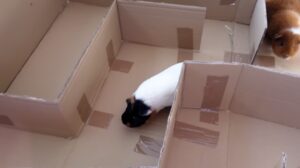How to Care for Guinea Pigs When You’re on a Budget
Owning guinea pigs can be a great experience, but it can also be costly. However, with some careful planning and creativity, you can provide excellent care for your furry friends without breaking the bank. This guide will show you how to care for guinea pigs on a budget, focusing on the key aspects such as feeding, bedding, toys, and health.
Feeding Your Guinea Pigs
Hay from a Farmer
Hay is a staple in a guinea pig’s diet ( making up 80-90% of their food ) and should be available at all times. Instead of buying expensive hay from pet stores, consider buying hay directly from a farmer. Hay from farmers is often fresher and more affordable. Our local farmer charges £4 for a bale and it lasts our piggies months. Just make sure the hay is clean and free of mould or dust.
Nuggets Not Muesli
When it comes to pellets, opt for nuggets instead of muesli mixes. Nuggets are more cost-effective and provide balanced nutrition without selective feeding issues. Muesli mixes can lead to picky eating habits where your guinea pigs may only eat the tastier bits and miss out on essential nutrients.
Foraging and Fruit & Veg Leftovers
Guinea pigs love fresh vegetables and fruits. Incorporate foraging into their routine by allowing them to nibble on safe plants from your garden. Use a free app like PictureThis to identify plants 🌱 if you’re unsure and avoid any toxic ones like buttercups. Additionally, use fruit and veg leftovers from your kitchen to supplement their diet. Ours love the strawberry tops 🍓 at this time of year. Just ensure that any food given is safe for guinea pigs to consume.
Bedding Solutions
Reusable Bedding
Bedding can be one of the most significant ongoing expenses in guinea pig care. Instead of disposable options like wood shavings or paper bedding, consider reusable bedding such as fleece liners or washable pads. These options are not only cost-effective in the long run but also environmentally friendly.
White Vinegar for Cleaning
Cleaning your guinea pig’s cage regularly is crucial for their health. White vinegar is an inexpensive yet effective cleaning solution that helps eliminate odours and disinfects surfaces without harmful chemicals. Mix equal parts white vinegar and water in a spray bottle for an easy-to-use cleaning solution. For approx 40p you can make over 1 litre of cage cleaner. Infuse with lemons 🍋 to minimise the vinegar smell 😉
DIY Toys and Hideys
Cardboard Creations
Guinea pigs need mental stimulation to stay happy and healthy. You don’t need to spend money on fancy toys; cardboard boxes 📦 can provide endless entertainment! Use cardboard boxes to create tunnels, hideys, or even mazes for your guinea pigs to explore. One of their most favourite activities will be hiding in a pile of hay, so don’t forget to incorporate a hay area inside their cage. You can use a hay tray to keep the hay contained.
DIY Toys
Get creative with DIY toys using household items like toilet paper tubes stuffed with hay or small paper bags filled with hay and a few treats. These simple toys encourage natural behaviours like chewing and burrowing without costing you anything extra.
Health Care Tips
Regular health checks are essential but don’t always require professional intervention unless there’s an issue:
- Nail Trimming: Learn how to trim your guinea pig’s nails at home using small animal nail clippers.
- Grooming: Regular brushing helps keep their coat healthy, especially when they malt in the spring and summer.
- Monitoring Weight: Weigh them weekly using kitchen scales ⚖️ to spot any sudden weight changes early.
If you notice any signs of illness (e.g., lethargy, loss of appetite), consult a vet promptly as early intervention can prevent more costly treatments later. It’s always worth contacting a few vets to compare. When Syrup needed tooth trimming we had quotes ranging from £30 to £250!!! ( the latter included a general anaesthetic which was totally avoidable when using a vet who was experienced with trimming )
Conclusion
Caring for guinea pigs doesn’t have to be expensive if you adopt some budget-friendly practices:
- Feeding: Buy hay from farmers, choose nuggets over muesli mixes, forage safely outdoors, and use fruit & veg leftovers.
- Bedding: Opt for reusable bedding solutions like fleece liners.
- Cleaning: Use white vinegar as a cheap and effective cage cleaner.
- Toys & Hideys: Create engaging environments with cardboard creations & DIY toys.
- Health Care: Perform regular home checks and look out for any signs of illness requiring professional attention.
By adding these tips into your daily routine not only will you save money but also ensure that your pets live happy healthy lives!



